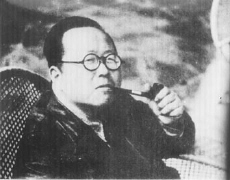Pan Guangdan

Pan Guangdan(Chinese:Phan quang đán;1898–1967) known in English asQuentin Pan,was a Chinese sociologist, eugenicist, and writer. He was one of the most distinguished sociologists andeugenicistsof China. Educated atTsinghua Universityon aBoxer Indemnity Scholarship,Dartmouth CollegeandColumbia University,where he was trained byCharles B. Davenport,[1]Pan was also a renowned expert on education. His wide research scope included eugenics, education policy, matrimony policy, familial problems, prostitute policy, and intellectual distributions. Pan's wide-ranging intellect led to his active participation in theCrescent Moon Society.[2]
Pan's most famous student wasFei Xiaotong,the "father of Chinese anthropology."[citation needed]
Career
[edit]Pan joined the China Democratic Groups League (laterChina Democratic League) in 1941, and was a standing committee member of the central committee of the League. During theAnti-Rightist Movement,he was determined to be a "rightist." Pan was persecuted inCultural Revolution,and died in 1967, at 69. He was rehabilitated in 1979.
Eugenics
[edit]For Pan, eugenics was both a political and scientific matter, as well as economic, ethnological and sociological; and he is credited with the popularization of eugenic thought in the 1920s and '30s in China. Some of his most influential works includeThe Eugenic Question in China(Trung quốc chi ưu sinh vấn đề) andChinese Family Problems(Trung quốc chi gia đình vấn đề)(1928). In these works, Pan promoted the family structure over individualism, which he believed, along with traditional marriage, to be most effective in racial improvement through biological inheritance. Urban living, he said, only promoted decadent individualism and contributed nothing to the racial fitness of the nation. Although he supported the use of state power for the implementation of eugenic policies, primarily through his founding of The Chinese Eugenics Institute, conflicts such as theSino-Japanese War,World War II,and thecivil warbetween theKMTand theCommunistsprevented governmental adoption of his ideas.[3]
In a 1937 volume of essays, "Minzu texing yu minzu weisheng"(Dân tộc đặc tính dữ dân tộc vệ sinhRacial characteristics and racial hygiene) Pan argued that government programs of health and reconstruction were of no use if the majority of the people were of low quality. He included his translations from the works ofEllsworth Huntingtonand the American missionaryArthur H. Smith's 1894 bookChinese Characteristics.Smith's chapters "Absence of Nerves", "Disregard of Accuracy", and "Absence of Public Spirit", he said, illustrated the selfish, unscientific, face-loving, "Chinese Everyman" who weakened the Chinese race. He called for educated and intelligent Chinese to increase their rate of birth and improve Chinese people's health by increasing the number of people who were genetically superior.[4]
Pan argued that the anthropological category of “race” was not yet scientifically substantiated. Eugenics as a newly established discipline should not, he believed, become entangled with dubious claims about superior races, since every “color” of people shared both the good and the bad germplasm distributed in its own population.[1]
During theSecond Sino-Japanese War,Pan was among the prominent Chinese eugenicists who viewed the war as a contest of population that would allow only the strongest to survive.[5]Consistent with this reasoning,Nationalist Chinaenacted more stringent abortion laws during the war.[5]
References
[edit]- Rocha, Leon Antonio (19 October 2015),"Quentin Pan phan quang đán inThe China Critic",China Heritage QuarterlyIncludes a substantial bibliography of scholarship on Pan.
Notes
[edit]- ^abChung, Yuehtsen Juliette (December 2014). "Better Science and Better Race?: Social Darwinism and Chinese Eugenics".Isis.105(4): 793–802.doi:10.1086/679426.ISSN0021-1753.PMID25665386.S2CID37502801.
- ^"P'an Kuang-tan,"Boorman, Howard L., et al., eds (1970).Biographical Dictionary of Republican China Vol III.New York: Columbia University Press.ISBN0231045581.
{{cite book}}:|first=has generic name (help)CS1 maint: multiple names: authors list (link),pp. 61-63. - ^Dikotter, Frank.The Discourse of Race in Modern China.Stanford: Stanford University Press, 1992. pp. 174–185.
- ^Ruth Rogaski,Hygienic Modernity: Meanings of Health and Disease in Treaty-Port China(Berkeley: University of California Press, 2004):pp.241-242
- ^abRodriguez, Sarah Mellors (2023).Reproductive realities in modern China: birth control and abortion, 1911-2021.Cambridge, United Kingdom. p. 42.ISBN978-1-009-02733-5.OCLC1366057905.
{{cite book}}:CS1 maint: location missing publisher (link)
External links
[edit]- Pan GuangdanWorldCatAuthority Page.
- 1898 births
- 1967 deaths
- Boxer Indemnity Scholarship recipients
- Chinese eugenicists
- Chinese non-fiction writers
- Chinese sociologists
- Columbia University alumni
- Dartmouth College alumni
- Educators from Shanghai
- Academic staff of Jinan University
- Academic staff of Minzu University of China
- Academic staff of the National Southwestern Associated University
- 20th-century Chinese writers
- Scientists from Shanghai
- Academic staff of Soochow University (Suzhou)
- Tsinghua University alumni
- Academic staff of Tsinghua University
- Victims of the Cultural Revolution
- Writers from Shanghai
- 20th-century non-fiction writers
